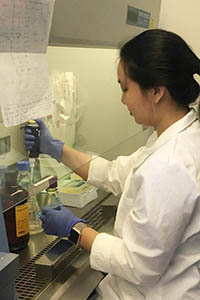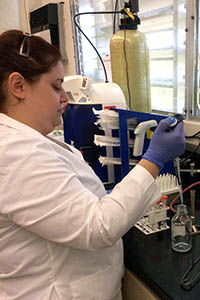

 From top: Janey Guo, Sasha Canovali and Sladjana Prisic
From top: Janey Guo, Sasha Canovali and Sladjana PrisicSeven University of Hawaiʻi at Mānoa students in the Prisic lab are recipients of Undergraduate Research Opportunities Program (UROP) awards. Jaymes Lonzanida, Jae Yun Lee, Brennen Yasuda, Sasha Canovali, Anna Scheiner, Janey Guo and Mattia Walter received support for their work with Sladjana Prisic, a Department of Microbiology assistant professor.
“My research experience in Prisic’s lab was overall very rewarding,” said Guo, a spring 2017 graduate. “It was a great opportunity to apply what I learned in my science classes to real experiments. As for future plans, I will be attending the University of Washington School of Pharmacy this September.”
Canovali, a major in molecular cell biology said “I am so grateful for the opportunity to work in the Prisic lab here at UH Mānoa. I have been able to use the resources as well as funding from UROP to conduct research. The work is challenging, but the experience is worth it. I plan to use the experience I’ve gained here in a career as a medical technologist.”
Prisic praised the program, “UROP gives so much more than money for reagents and stipends, it provides the structure, i.e., students need to write a proposal, send reports, deal with their budget, and present their work at the end of the study. Most importantly, students get highly motivated when their projects are seen as worth being funded.” Prisic hopes that the program will expand to provide more research opportunities for students and encourage more faculty to open their labs for UROP students.
A bridge between teaching and research
“Doing research is quite different experience from lab courses and all science majors should have an opportunity to do ‘real’ experiments,” said Prisic who teaches biology of microorganisms and the associated lab. The core course has almost 200 students and eight lab sections that train students in basic microbiology techniques.
Prisic has been building a strong research group since she joined UH Mānoa in fall 2014. She has received grants from the National Institutes of Health to study alternative ribosomal proteins from Mycobacterium tuberculosis, the causative agent of tuberculosis, and from the Leahi Fund from the Hawaiʻi Community Foundation to study tuberculosis biomarkers.
Students strive to improve tuberculosis therapy
“From the description of our research, you may think that my group is not undergraduate-friendly, but you would be wrong,” said Prisic. Since the opening of her laboratory in October 2014, 19 undergraduate students have worked in her lab.
Undergraduate students cannot work with pathogens such as M. tuberculosis. However, ribosomes studied in Prisic group are essential for survival of all organisms and similar regulatory mechanisms can be studied in non-pathogenic model organisms, such as Mycobacterium smegmatis and Bacillus subtilis. Students work with safe organisms and are still a part of the larger goal of finding new anti-tuberculosis treatments. Postdoctoral fellow Celeste Yergin and graduate students Allexa Dow and Brandi Antonio supervise and train undergraduates in areas including purify proteins or making mutants in bacteria. By creating an atmosphere of responsibility and interdependence, Prisic has achieved the sense of unity in her group.
“Undergraduate students bring positive energy to the lab and they have expanded and improved our research,” she said.
—By Tony Hall

